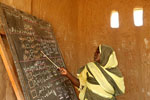
In 2000, global leaders and international institutions committed to the eight Millennium Development Goals to end extreme poverty by 2015. The goals, which range from promoting gender equality and empowering women to eradicating extreme poverty and hunger, include achieving universal primary education. While significant progress has been made toward increasing enrollment in primary education globally, the number of children out of school in sub-Saharan Africa has risen over the past three years. Education inequality is particularly high among populations who have suffered from conflict and humanitarian crises, such as those living in refugee camps—the communities we are targeting through the activities of the Darfur Dream Team Sister Schools Program.
To highlight the challenge of achieving universal primary education in sub-Saharan Africa the Brookings Center for Universal Education created “The Africa Learning Barometer” in collaboration with This is Africa, a publication of the Financial Times. The Africa Learning Barometer is an interactive tool which uses existing data from 28 countries, two regional assessments, and three national assessments and focuses on four indicators—school enrollment, school completion, quality of education, and education inequality—to assess the current state of learning on the continent.
At last week’s launch of the barometer in Washington, D.C., panelists focused their discussion on the indicators of quality of education and education inequality. According to the barometer, while access to primary education has grown sizably, the quality of education being received throughout the region is lacking considerably; an estimated 45 percent of the children enrolled in school in sub-Saharan Africa are not learning. Panelists noted that this is a result of many factors, such as shortage of resources, teacher absenteeism, and lack of pressure from citizens for higher standards and transparency. Education inequality, according to the panelists, is a product of poverty, gender, and other social divisions, including marginalized populations and regions.
In recognition of the particular vulnerability of communities that have experienced conflict, leading agencies in the international community have begun to increase their efforts toward addressing these challenges. For the first time ever, education is featured prominently on the five-year agenda of the U.N. secretary-general. At the 2012 U.N. General Assembly meeting this week, Secretary-General Ban Ki-moon will announce Education First, a new initiative aimed at addressing these issues. Education First has three priorities: making the opportunity of education available to all children including those in marginalized areas, improving the quality of learning, and fostering global citizenship. Additionally, under its new Education Strategy, UNHCR, the U.N. refugee agency, seeks to improve and expand access to early childhood, primary, secondary, and tertiary education for millions of refugee children over the next four years.
Since 2007, the Darfur Dream Team Sister Schools Program, with the support of schools and organizations across the United States, has been at the forefront of supporting quality primary education for and building personal connections with Darfuri children who have been displaced by conflict and live in refugee camps. The African Learning Barometer initiative is a great reminder and call to action that our work to transform lives through education matters now more than ever.
Photo: A teacher in a Darfuri refugee camp in eastern Chad (Darfur Dream Team)

